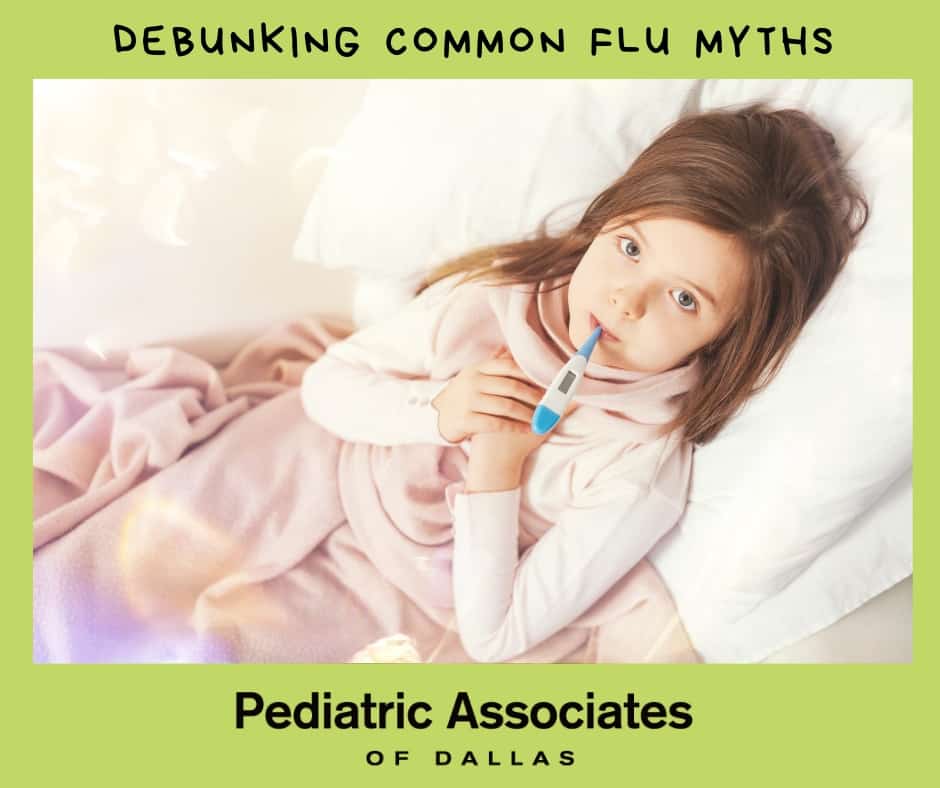With the flu being in full swing in Dallas in the last couple of weeks, we wanted to take the time to debunk some common flu myths.
The most effective way of preventing the flu is by getting your FLU SHOT! It’s not too late to get vaccinated, call Pediatric Associates of Dallas today to schedule!

Myth # 1: You can’t get the flu if you got your flu shot.
Fact: We wish flu shots were 100% effective at preventing the flu, but sadly this is not the case. The great thing about flu shots is that if your child is vaccinated and does still get the flu, they likely will have a much milder case. The flu shot is very effective in preventing serious complications, hospitalizations, and deaths associated with the flu. In fact, of the children who died from the flu last year, 80% were not vaccinated.
Myth # 2: The Flu is Really Scary, and Lots of People Die From It.
Fact: What the news doesn’t show you is what we see every day in our office, previously healthy children who get the flu, feel bad for a few days to a week, and make a full recovery. The most common side effects we see from the flu are fever, cough, congestion, sore throat, runny nose, and fatigue, it is basically a really bad cold!
Myth #3: Common Misleadings of Tamiflu
Fact: For previously healthy children over the age of 2, the CDC does not recommend treatment with Tamiflu. The CDC also does not recommend routine dosing of preventative Tamiflu dosing in patients who are not high risk. In children under the age of 2 or with underlying medical conditions (such as asthma or diabetes), treatment with Tamiflu should be initiated as soon as possible, ideally within 48 hours of symptom onset.
Tamiflu is not an antibiotic. Your child will get better without taking Tamiflu. Tamiflu will not make the flu magically go away. It may shorten the length of symptoms by about 1 day.
One of the main reasons we do not like using Tamiflu in our pediatric patients is the side effects. Tamiflu often causes vomiting and nausea, increasing the risk of dehydration in a child who already may not feel like eating much and making your child feel even worse. More serious side effects include hallucinations, behavioral changes, and self-harm.
So, what can you do for your child who has the flu?
We recommend lots of rest and hydration! Your child may not feel like eating, but make sure they are drinking and staying hydrated. His appetite will return when he is feeling better. If needed, treat your child with Tylenol or Motrin (if over 6 months of age) for fever. Remember to not only pay attention to the number on the thermometer but how your child is acting as well. Kids are amazingly resilient, and may be running around the room with a 102 fever! For younger children who cannot blow their noses themselves, you need to help them by using saline and suctioning out their nose (see video for example). You can also steam up the bathroom and let them play in there. It also helps to run a cool mist humidifier, especially if you are running your heater, which dries out the air. We do not recommend cough suppressants, but honey works great in children over the age of 1.
When should my child see a doctor?
If your child is experiencing any difficulty breathing, showing signs of dehydration, or has a fever (100.4 and above) lasting for more than 72 hours your child should be evaluated.
For children in high-risk groups (less than 2 years of age, underlying condition like asthma or diabetes) your child should be seen within 48 hours of symptoms.
Please don’t hesitate to call P.A.D. and speak to our friendly and well-educated nurses if you have any questions!
Written by Rhiannon Simes

Rhiannon Simes is a Pediatric Nurse Practitioner in Dallas, TX. While working as a nurse in a pediatric primary care office during graduate school, she developed her passion for educating and empowering parents so that they feel confident caring for their children. She has a wonderful husband and sweet puppy dog who are tired of her going on and on about medical stuff, so she decided to write a blog post instead.
Sources:
https://www.hippoed.com/peds/rap/episode/thenewflureview1/thenewflureview2
https://www.cdc.gov/flu/professionals/antivirals/summary-clinicians.htm
